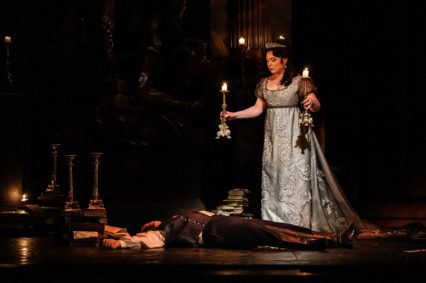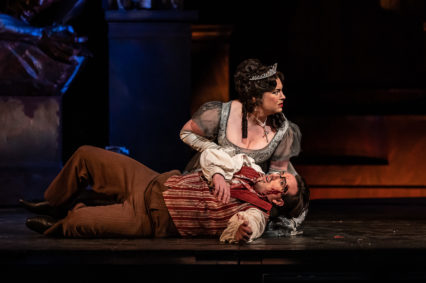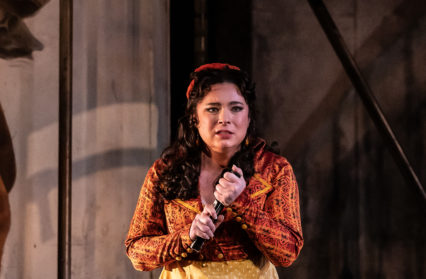As Ukrainian-Welsh soprano, Natalya Romaniw takes up the role of Tosca in The Royal Opera House, Linda Christmas applauds a Tosca cast that is home grown, and explores how Swansea’s Natalya Romaniw prepared for this important debut.
Some nights at the opera are sprinkled with star-dust: you can usually spot them in advance because they are sold-out (a rarity these days). And you can certainly spot them afterwards because audience members can be heard boasting: “I was there!”. December 12, 2022 was one such. The Royal Opera House, Covent Garden, offered an exceptional young cast. At 7.45pm, Tosca walked regally onto the stage: Natalya Romaniw, the Ukrainian-Welsh soprano from Swansea, 35, was making her Royal Opera House debut. There to greet her was her lover, Mario Cavaradossi, aka Freddie De Tommaso, 29, born in Tunbridge Wells. Both youth and potential were on display. What was less obvious was the fact that it was the first time in 70 years that two British artists held the starring roles in one of the opera world’s much-loved operas. The last time this happened was January 25, 1954. Walter Midgley was the tenor and Victoria Sladen the soprano. That performance was for one night only, Romaniw and De Tomasso have four performances!
Next morning The Times declared: “A Home Grown Triumph” and added: “Flag waving is justified because singers have come and gone in this production [now 16 years old] and few have left their mark despite the air miles they clock up. Romaniw’s Tosca is sumptuously sung. She fills out Puccini’s lyrical lines with creamy elegance.” Continuing the praise, The Stage stated: “Her soprano combines a luscious quality with a gleaming surface, and she has clearly explored the titular volatile opera singer at the centre of this drama in some depth. While her interpretation will undoubtedly develop further, its coherence and detail already make her an unusually convincing protagonist.”

All eyes were on Natalya Romaniw, but to be fair, to help her shine she needed two supporters: Maria Cavaradossi, a painter and political activist (De Tommaso); and Scapia (Erwin Schrott) the police chief who wants Cavaradossi dead and Tosca in his clutches. He sexually harasses her until she kills him! Schrott, aged 50, and a seasoned artist, gave an accomplished sneering interpretation. And De Tomasso earned praise earlier in the month when he made his unexpected role debut midway through a performance of Tosca. (The scheduled American tenor, Brian Hymel had to bow out for health reasons.) On that evening, De Tommaso was awarded three accolades: he saved the show; he was, at 29, the youngest tenor to sing the role at the Royal Opera House and he was the first British tenor to sing the role there for 60 years – since Charles Craig in 1963.
With that duo in place, all eyes were indeed on Romaniw. She too had a last-minute shock to boost her confidence. A couple of weeks ago, she replaced Amber Braid in Andreas Kriegenburg’s production of Tosca in Frankfurt – with a mere 24 hours’ notice. When we meet, I ask how it felt.
“It was both petrifying and exciting all at once. The wonderful thing is that you don’t have too much time to think, you deal with it, that’s all you could do. Fortunately, the production was straightforward. I managed to pull it out of the bag! This experience in Frankfurt helped, in so many ways, to prepare me for my Covent Garden debut. It made me feel more than capable. I could tell myself you have done this – you’ve got this!”
Frankfurt was hardly her first Tosca. Romaniw has enjoyed a carefully paced journey over a number of years. Her first brush with the role came in her early days at the Guildhall School of Music and Drama when the teacher asked the newly arrived students if anyone would like to sing an aria. “My hand shot up and I said I can sing “Vissi d’arte!” Everyone looked surprised. I had no idea that this was the iconic aria from Tosca, and no idea that it was not the ideal aria for a novice. My naiveness was quite endearing! My teacher in Swansea had given me this to sing because she wanted to open the top of my voice! Weird, isn’t it?”
Since then, she has performed the role with Scottish Opera; a small French festival, Lyrique en Mer/Festival de Belle Île, and a semi -staged version, with a head mic, in the open air, at Crystal Palace. All garnered strong reviews, including the stint in the park: “Natalya Romaniw, a diva to her fingertips, was an ideal Floria Tosca, fierily jealous and ferociously vengeful. Here was a Tosca to grace any opera house, let alone a walk in the park!”. Earlier this year she covered the role at ROH for Angela Gheorghiu, which gave her invaluable knowledge of the production and the feel of the stage.
Despite this careful build-up Dec 12 is a hurdle, she told me shortly before the first night. “There will a lot of eyes on me on because it is my ROH debut and I am British, so there is pressure, but one of the things I like to do is play the performance out in my mind, almost like a film, you can then see it; you feel it, smell it – get into the bones of it, and believe that you are Tosca. But there will be nerves.”
“ROH is the pinnacle for me, because I am British especially. When I first came to London to study, I went to ROH for the first time and it seemed out of reach and unattainable, only for the starry people of this world. I went a lot buying £15 tickets and watched Gheorghiu and Nebtrebeko. And here I am! I covered Gheorghiu in February. I would have covered Netrebko too if the performances had not been cancelled because of Covid. So yes, I know what it is like to be at Covent Garden, but very much in the shadows. Now, it is different. I have a dressing room with my name on it. I have taken a photograph of it! The other names next to mine are Malin Bystom and Lizette Oropesa. I am like, yeah! So happy and excited. I am one of them now: one of the groups of distinguished sopranos!”

London, UK; 10 December 2022. © 2022 ROH Photographed by CLIVE BARDA
Does all of this means that she get the fees to go with the label on the door? “NO, I need a couple more gigs before I can command top fees!”
I ask if there a key moment in this performance when she would like me to cross my fingers.
“Vissi d’arte of course! I watched Marlin singing this iconic aria, earlier in the run. She’s 51, and looks incredible, but I sensed the nerves at this point and that selfishly made me feel much better. This aria is so iconic and so exposed, the drums, the silence, the pianissimo start. To ground me, I sing with my hand on a statue. It is important to feel comfortable. Marlin sang it on her knees because she finds it helps her and in Frankfurt I sang on my knees because it was part of the staging. At Scottish Opera I had to sit down on a chaise, but I didn’t like that as I felt a bit squished, so I got up! No, watching Marlin didn’t bother me. We are different voice types: her voice is more Germanic and mine is more Italianate.”
Why does every leading soprano not just yearn to sing this role but hope to gain legendary status? Who yearns to sing Puccini’s other heroins, Butterfly or Fancuilla or Mimi? The list of starry names attached to Tosca is impressive, covers many nationalities and includes Eva Turner (British) and Gwyneth Jones (Welsh). And, of course, Maria Callas who is seen by some as the supreme interpreter.
“Tosca is an opera singer! She’s a prima donna! The first time I sang the role for Scottish opera in 2018, I didn’t believe in myself the way I do now. Tosca takes it for granted that everyone has come to see her! I can feel the role now. I am not over-confident, but I am confident enough to portray her. That’s a big part of it. There is a fair amount of singing compared to La Boheme which has little more than a total of 20 minutes in total. Tosca has perhaps three times that amount – I haven’t really counted! But is so well-paced that it feels manageable.”
At this point Romaniw begins to dissect the character of Tosca in detail which demonstrates that George Hall’s review in The Stage was correct in suggesting she has explored the character in depth. “She is such a full bloodied character, so strong, so fiery and I enjoy this! She is a Diva in control professionally, but in her private live she struggles, her insecurities show. You can tell she expects to control everything just as she does on the stage, but she can’t. She wants Mario’s painting of the Madonna to have dark eyes like hers. He wants to keep the blue eyes. She seems jealous. Then, later in the scene, she says to Maria: “Now listen. After tonight’s show which will be short, I will come to you and we will escape to our cottage.” When he hesitates because his mind is on the escaped prisoner he is harbouring, she can’t fathom it. In the second act, she also tries to be one step ahead of Scarpia: “How much?” she snaps at him, thinking she can buy him off. She can’t. Off stage she is insecure and it shows.”
Does her appearance at ROH mean that the House is making more of an effort to embrace home-grown talent, I wonder? “Yes, the pandemic forced them to do so. I have been in the casting director’s eye for some time, since I was chosen for the Young Artists programme but chose to go to Houston instead. I did an audition for him in 2014 and he said I was not ready and he was right. Then he saw me doing Butterfly at ENO before the pandemic and that’s what convinced him I was ready. ENO is completely fundamental to me; without ENO I would not be here. The place is special, it’s very much a family. My dresser, Sue has been there for 25 years or so. They have had all their funding cut and I don’t know what is going to happen to them. They have a million plans in case of this that and the other. I just think the government we are under is so lacking in compassion towards culture and the arts. I’ve heard a rumour – it is only a rumour – that Glyndebourne on tour will cease to exist. That was the first thing I did when I returned from the young artists programme in Huston: I was the Governess in Britten’s Turn of the Screw, in the tour. All these opportunities for young singers are disappearing. I feel lucky to have experienced the good days and now I am on a bit of a footing, but anyone trying to get a start will have to look elsewhere to find the necessary building blocks. It’s very bleak!”
Is she tempted then to decamp to Germany, where she has already made her mark, and they seem to have an opera house in every largish city? “NO, no! It’s the young I am worried about not myself. I am off to do Tosca in Hamburg in January, then I have Ariadne in Garsington, and another Verdi Requiem. Then I think there is a bit of a gap…”
Perhaps the gap will disappear after December 12?
Tosca plays at the Royal Opera House until Wednesday 21st December, details are available here.
Linda Christmas is an author, journalist and opera buff.












